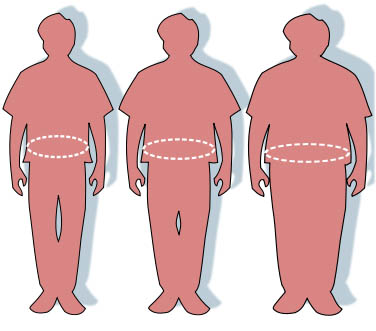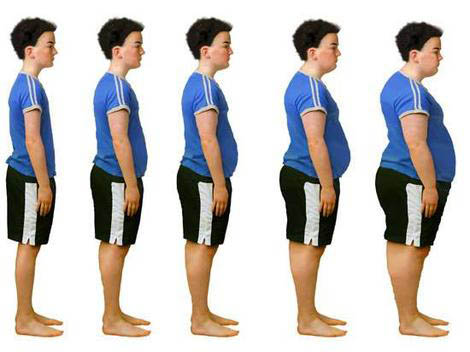

February 5, 2013
Obesity and obsession - humans like to eat for many reasons - instant gratification, conditioning, boredom, genetics, dealing with issues, emotional problems - food part of obsessive compulsive disorder - you've heard this all before. It's not easy losing weight - and the keeping the pounds off as old eating habits return.
Weight has been an obsession with people for centuries - those with personality disorders often becoming anorexic or bulimic in an attempt to keep weight under control and be thin, yet the concept of thin various from looking like a model or performer to just being a normal weight for one's height.

Are thin hot women more appealing? Yes ... but trying to look like them can take its toll on one's body. These performers work very hard to look like this and generally find the special diet that works well with their body chemistry. To this end, one can do trial and error on their own to find the right combination of foods, consult a nutritionist or weight loss group, or go to a gym.
We learn early on that being "thin to average" generally reflects good health for body, mind, and soul. Thin people generally look better and therefore feel confident about themselves which goes to a whole host of self-esteem issues and lifestyles.
We all know about dieting and what to eat depending on personal health issues. Organic products are all the rage - the important key being - food should be fresh.

We also know that obesity in children, as well as adults, is a growing problem that is being addressed by the medical community. Some believe it is becoming an epidemic. Childhood obesity has both immediate and long-term effects on health and well-being.
Obesity is a medical condition in which excess body fat has accumulated to the extent that it may have an adverse effect on health, leading to reduced life expectancy and/or increased health problems. People are considered obese when their body mass index (BMI), a measurement obtained by dividing a person's weight in kilograms by the square of the person's height in metres, exceeds 30 kg/m2.
Obesity increases the likelihood of various diseases, particularly heart disease, type 2 diabetes, obstructive sleep apnea, certain types of cancer, and osteoarthritis. Obesity is most commonly caused by a combination of excessive food energy intake, lack of physical activity, and genetic susceptibility, although a few cases are caused primarily by genes, endocrine disorders, medications or psychiatric illness. Evidence to support the view that some obese people eat little yet gain weight due to a slow metabolism is limited; on average obese people have a greater energy expenditure than their thin counterparts due to the energy required to maintain an increased body mass.
Dieting and physical exercise are the mainstays of treatment for obesity. Diet quality can be improved by reducing the consumption of energy-dense foods such as those high in fat and sugars, and by increasing the intake of dietary fiber. Anti-obesity drugs may be taken to reduce appetite or inhibit fat absorption together with a suitable diet. If diet, exercise and medication are not effective, a gastric balloon may assist with weight loss, or surgery may be performed to reduce stomach volume and/or bowel length, leading to earlier satiation and reduced ability to absorb nutrients from food.
Obesity is a leading preventable cause of death worldwide, with increasing prevalence in adults and children, and authorities view it as one of the most serious public health problems of the 21st century. Obesity is stigmatized in much of the modern world (particularly in the Western world), though it was widely perceived as a symbol of wealth and fertility at other times in history, and still is in some parts of the world.
What you thought you knew about obesity is wrong CNN - February 5, 2013

Editor's note: Dr. Aaron E. Carroll is an associate professor of pediatrics at the Indiana University School of Medicine and the director of the university's Center for Health Policy and Professionalism Research.
I've written quite a bit about medical myths, so I'm always a bit skeptical about medical "knowledge." But one thing I, and I'm sure many of you, think we understand is obesity. After all, weight issues crop up in media constantly. Just last night, Gov. Chris Christie was joking about donuts and his weight on The Late Show with David Letterman, and the First Lady's weight is once again a subject of discussion in the Washington Post--even though by any objective standard she's in great shape.
We know how people gain weight, and we think we know how to lose it.
Except a study in this week's New England Journal of Medicine shows us that's just not right. Pretty much everything we "know" about obesity and weight loss is wrong.
Let's start with some things that are true.
More than a third of Americans are obese. Many more are overweight. The Centers for Disease Control and Prevention estimates that obesity-related medical costs were almost $150 billion in 2008, and the cost in health related expensed for an average person who was obese was more than $1,400. This doesn't count the physical, mental or quality-of-life toll that obesity can levy on a person.
Few of us dispute that we need to do something about this problem. There are plenty of experts (present company included) who will tell you what needs to be done. The sad truth, though, is that lots of that advice (even mine) turns out to be mistaken.
I know I've told people that making small, sustained lifestyle changes is the best way to lose weight over time. But it turns out that making such changes, say by deciding to walk a mile every day for five years, results in far less weight loss than you'd expect.
Coca-Cola weighs in on obesity fight - It's a statistic we've been hearing far too often -- and for far too long. Two-thirds of American adults are either overweight or obese -- and the problem is only getting worse. Even Coca-Cola, the world's largest beverage company, is now calling obesity "the issue of this generation."
I've lectured people about the importance of physical education in schools, and I've seen countless reports declaring that the decrease in PE nationwide is one of the reasons that more children are obese or overweight today. It turns out that studies don't show that's the case.
My family loves watching "The Biggest Loser." But I've found myself telling my kids again and again that what's shown on TV isn't the best way to lose weight. I tell them that slow and steady works better in the long-run than rapid weight loss. I also tell them that setting unrealistic weight goals can actually sabotage your efforts.
So imagine my shock to discover that what evidence exists in this new study hints towards ambitious goals being a good thing, and that quicker weight loss isn't less likely to be kept off in the long-term.
People will say eating breakfast is a good idea when you're trying to lose weight, because it will keep you from binging later. But studies show that there's no protective effect from eating breakfast at all. People will say that eating more fruits and vegetables is a great way to lost weight. But studies show that, on their own, eating more of them without making other behavioral changes doesn't result in any weight loss. There's no magic to fruits and vegetables.
People will say that snacking in between meals can lead to weight gain. But studies don't show that to be the case either. In general, people compensate for snacking throughout the rest of the day. In other words, it's not necessarily bad to snack outside of usual meal times.
It's all enough to cause one to despair. But just because so much of what we believe is wrong doesn't mean we still can't do something about the issue.
Studies do show that you can absolutely overcome genetic and familial factors to lose weight.
They show that significant physical activity can help with weight loss, and that it has the added bonus of making you healthier in general. Reducing your caloric intake works overall, especially if it's done in a way to change your overall eating habits. Getting the whole family involved is important. And finally, for some, bariatric surgery can result in life-changing outcomes.
Over the past five years, my wife and I have lost quite a bit of weight. I'm down somewhere between 15% to 20% of my high of more than 200 pounds. My wife lost even more, although I'm not going to give you any numbers (I like being married). Now that I look back, if I'm going to be honest about it, I did it in bursts over a few months here and there, each time gaining back less than I had lost.
Each time, I had ambitious goals of 15 pounds or more in two to three months, and each time I really restricted my caloric intake. But I've kept the weight off by radically changing my overall eating habits.
My breakfast consists of just coffee, I eat very light lunches, such as salads, and dinner is usually a healthy home-cooked meal with the family. My wife cooks way more than she used to and is obsessed with finding ways to make meals healthier. I avoid fried foods almost entirely, and I can't remember the last time I ate in a fast food restaurant. I also get to the gym two to three times each week.
I don't tell you this because I think this is what you should do, or because I think it's the key to getting thinner. I tell you this because more and more, I think that the journey to sustained weight loss is a very personal and individual path. Perhaps our problem is we're trying to find a one-size-fits-all solution. I'm not sure that exists.
Lastly, what was left out of this new scientific paper was prevention. The single best way to fight obesity is to avoid it in the first place. That has to start when kids are young, and it's a lifelong journey. But one thing I doubt will ever be proved false is that it's much easier not to gain the weight in the first place than to take it off later.
Brain circuit that makes it hard for obese people to lose weight PhysOrg - February 6, 2013
Imagine you are driving a car, and the harder you press on the accelerator, the harder an invisible foot presses on the brake. That's what happens when obese people diet - the less food they eat, the less energy they burn, and the less weight they lose.
While this phenomenon is known, scientists at Sydney's Garvan Institute of Medical Research and the University of NSW have pinpointed the exact brain circuitry behind it and have published their findings in the prestigious international journal Cell Metabolism, now online.
Dr Shu Lin, Dr Yanchuan Shi and Professor Herbert Herzog and his team have been studying the complex processes behind energy balance using various mouse models. They have shown that the neurotransmitter Neuropeptide Y (NPY), known for stimulating appetite, also plays a major role in controlling whether the body burns or conserves energy. The researchers found that NPY produced in a particular region of the brain - the arcuate nucleus (Arc) of the hypothalamus - inhibits the activation of 'brown fat', one of the primary tissues where the body generates heat.